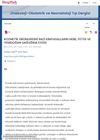11 citations,
December 2021 in “Journal of Ginseng Research/Journal of ginseng research” Red ginseng oil is believed to have various health benefits and is safe, but more research is needed to fully understand how it works.
9 citations,
June 2023 in “Cells” Certain natural and synthetic compounds may help treat inflammatory skin diseases by targeting a specific signaling pathway.
 9 citations,
November 2022 in “Applied sciences”
9 citations,
November 2022 in “Applied sciences” Marine algae compounds may improve skin health and promote hair growth.
 8 citations,
June 2021 in “Frontiers in Bioengineering and Biotechnology”
8 citations,
June 2021 in “Frontiers in Bioengineering and Biotechnology” Extracts from Alnus sibirica and oregonin may help with hair growth and prevent hair loss.
 7 citations,
March 2021 in “Evidence-based Complementary and Alternative Medicine”
7 citations,
March 2021 in “Evidence-based Complementary and Alternative Medicine” Nelumbinis Semen extract helps hair grow and could prevent hair loss.
7 citations,
August 2020 in “Plastic and reconstructive surgery. Global open” QR 678 and QR 678 Neo are safe and promote hair growth, potentially helping chemotherapy-induced hair loss.
7 citations,
June 2012 in “Journal of dairy science” Bovine milk fats applied to mouse skin can promote hair growth similar to known hair growth treatments.
6 citations,
March 2022 in “International journal of molecular sciences” Natural skincare products may help reduce sun damage and support the skin's daily cycle.
 6 citations,
December 2019 in “BMC Complementary and Alternative Medicine”
6 citations,
December 2019 in “BMC Complementary and Alternative Medicine” Alcohol extract from Vernonia anthelmintica seeds may help treat stress-related hair loss.
6 citations,
November 2018 in “Journal of molecular histology” Testosterone increases fluid secretion and aquaporin expression in the vas deferens, which is important for male fertility.
 5 citations,
October 2022 in “Cosmetics”
5 citations,
October 2022 in “Cosmetics” Cell-based models help test if cosmetic ingredients really work for hair growth and skin health.
 5 citations,
October 2021 in “Journal of Ovarian Research”
5 citations,
October 2021 in “Journal of Ovarian Research” Cinnamon can help manage symptoms of polycystic ovary syndrome, improve menstrual cycles and fertility, and positively affect cholesterol and blood sugar levels, but more research is needed to confirm these effects and find the best dosage.
 5 citations,
April 2020 in “Jinekoloji - obstetrik ve neonatoloji tıp dergisi”
5 citations,
April 2020 in “Jinekoloji - obstetrik ve neonatoloji tıp dergisi” Some chemicals in cosmetics may harm pregnant individuals, fetuses, and newborns, and should be avoided unless necessary.
 4 citations,
October 2022 in “Nutrients”
4 citations,
October 2022 in “Nutrients” Personalized diets, like the Mediterranean Diet and low carb diets, can help manage PCOS symptoms in obese women, and probiotics may enhance weight loss and improve metabolic health. More research is needed to find the best diet strategies.
 4 citations,
November 2021 in “Pharmaceuticals”
4 citations,
November 2021 in “Pharmaceuticals” Paeonia lactiflora and Poria cocos extracts can potentially increase hair growth and reduce hair loss symptoms by lowering testosterone and inflammation levels.
4 citations,
October 2021 in “Microorganisms” Men with androgenetic alopecia have different scalp oils and microbes compared to those without.
 4 citations,
April 2012 in “Asian-australasian Journal of Animal Sciences”
4 citations,
April 2012 in “Asian-australasian Journal of Animal Sciences” Red deer antler extract may help hair grow faster by increasing a growth protein.
 2 citations,
November 2023 in “Bioactive materials”
2 citations,
November 2023 in “Bioactive materials” New method improves copper peptide delivery for hair growth three times better than current options.
 2 citations,
May 2023 in “Current Nutrition Reports”
2 citations,
May 2023 in “Current Nutrition Reports” Eating a Mediterranean diet and taking certain supplements may improve symptoms of PCOS.
2 citations,
April 2023 in “PubMed” Improving maternal diets can prevent severe health issues, including death, from goiter in goat kids.
 2 citations,
January 2023 in “Pharmaceuticals”
2 citations,
January 2023 in “Pharmaceuticals” Natural products and phytochemicals may help with hair regrowth, but more research is needed.
2 citations,
April 2021 in “Asian pacific Journal of Tropical Biomedicine” Origanum vulgare leaf extract reduces liver and kidney damage caused by finasteride in mice.
1 citations,
March 2024 in “Nanomaterials” Biomimetic scaffolds are better than traditional methods for growing cells and could help regenerate various tissues.
1 citations,
January 2024 in “International journal of molecular sciences” MicroRNAs could be key biomarkers and therapeutic targets for PCOS.
 1 citations,
November 2023 in “Journal of ovarian research”
1 citations,
November 2023 in “Journal of ovarian research” Agaricus subrufescens improves ovarian function and biochemical health in rats with PCOS.
1 citations,
November 2023 in “Polymers” Polyurethane dressings show promise for wound healing but need improvements to adapt better to the healing process.
 1 citations,
January 2023 in “Metabolites”
1 citations,
January 2023 in “Metabolites” Changes in gut bacteria can contribute to the development of Polycystic Ovary Syndrome (PCOS), affecting metabolism, immunity, and causing inflammation. Treatments may involve adjusting these factors.
 1 citations,
December 2022 in “Pharmaceuticals”
1 citations,
December 2022 in “Pharmaceuticals” Noni fruit extract, specifically the FEA-3 sub-fraction, can increase hair growth and reduce baldness in male rabbits, potentially acting like common hair loss treatments.
 1 citations,
November 2022 in “International Journal of Molecular Sciences”
1 citations,
November 2022 in “International Journal of Molecular Sciences” Kelulut Honey can help regulate sex hormone receptors in rats with Polycystic Ovary Syndrome, similar to common medications.
 1 citations,
October 2022 in “Journal of food and nutrition research”
1 citations,
October 2022 in “Journal of food and nutrition research” Cinnamon may help manage obesity and improve conditions related to Polycystic Ovary Syndrome (PCOS).

















